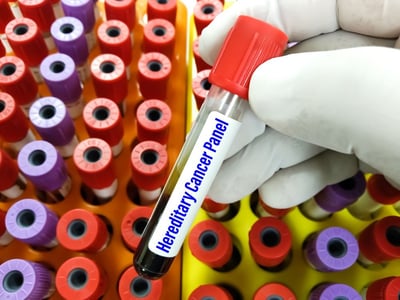FORCE's eXamining the Relevance of Articles for You (XRAY) program looks behind the headlines of cancer news to help you understand what the research means for you.
XRAY is a reliable source of hereditary cancer research-related news and information.
Learn more about the XRAY program
Categories Cancer Risk
Relevance: Medium


Personal Story : Living a full life with Li-Fraumeni syndrome
Relevance: Medium


Most relevant for: People with Li-Fraumeni syndrome
This XRAY review is about a five-time cancer survivor who has an inherited mutation in the TP53 gene. People with inherited mutations in TP53 have Li-Fraumeni syndrome, which is linked to a very high lifetime risk for many types of cancer. Here we share his inspiring story and provide more information on Li-Fraumeni syndrome. (Posted 4/16/24)
Read More
Relevance: High


Strength of Science: High


Research Timeline: Post Approval


Study : Genetic testing among people with cancer can find mutations that may affect treatment and prevention
Relevance: High


Strength of Science: High


Research Timeline: Post Approval


Most relevant for: People diagnosed with cancer who have not yet had genetic testing
Despite national guidelines recommending genetic testing, less than 10 percent of eligible patients had genetic testing within two years after their cancer diagnosis. Among those who had testing, 10-30 percent had an inherited mutation that could affect their medical care. (Posted 3/15/2024)
Read More
Relevance: Medium-High


Strength of Science: Medium-High


Research Timeline: Post Approval


Study : Estrogen without progesterone for hormone replacement may lower breast cancer risk
Relevance: Medium-High


Strength of Science: Medium-High


Research Timeline: Post Approval


Most relevant for: Postmenopausal people on hormone replacement therapy
Women with average breast cancer risk who took estrogen without progesterone after menopause had lower rates of breast cancer than those who did not take any hormone replacement. This finding comes from studies looking at the safety of the use of estrogen alone as hormone replacement therapy. (Posted 2/13/24)
Este artículo está disponible en español.
Read More
Relevance: Medium-High


Strength of Science: Medium-High


Research Timeline: Post Approval


Study : Genes linked to aggressive prostate cancer
Relevance: Medium-High


Strength of Science: Medium-High


Research Timeline: Post Approval


Most relevant for: People diagnosed with advanced prostate cancer
Previous research has linked some inherited mutations to prostate cancer risk. This study found a link to additional genes that should be added to prostate cancer gene panel tests. The study also looked at which genes were most closely linked to aggressive prostate cancer that is more likely to spread. (Posted 2/1/24)
Este artículo está disponible en español.
Read More
Relevance: Medium-High


Strength of Science: Medium-High


Research Timeline: Post Approval


Study : H. pylori bacteria infection and risk of stomach cancer in mutation carriers
Relevance: Medium-High


Strength of Science: Medium-High


Research Timeline: Post Approval


Most relevant for: People who are at increased risk for stomach cancer due to an inherited mutation.
The results of a study in Japan show that people with a bacterial infection called H. pylori and an inherited mutation in an ATM, BRCA1, BRCA2 or PALB2 gene have a high risk of stomach cancer. (Posted 1/19/24)
Este artículo está disponible en español.
Read More
Relevance: Medium-High


Strength of Science: Medium-High


Research Timeline: Post Approval


Study : Benefit of pancreatic cancer screening
Relevance: Medium-High


Strength of Science: Medium-High


Research Timeline: Post Approval


Most relevant for: People with an inherited BRCA1 or BRCA2 mutation
Among people with an inherited mutation in a BRCA1 or BRCA2 gene, screening for pancreatic cancer found most cancers at an earlier stage when they could be treated by surgery. Posted 1/17/24)
Este artículo está disponible en español.
Read More
Relevance: Medium-High


Strength of Science: Medium-High


Research Timeline: Post Approval


Study : Genes, genetic counseling and disparities in endometrial cancer
Relevance: Medium-High


Strength of Science: Medium-High


Research Timeline: Post Approval


Most relevant for: People diagnosed with endometrial cancer
Endometrial cancer is on the rise, and it can run in families. Genetic counseling has benefits for people with cancer and their family members. However, Black women with endometrial cancer more often have worse outcomes than white women. Black women with endometrial cancer who test positive for an inherited mutation are less likely to see a genetic counselor. Given these disparities, Black women would benefit from better access to and referrals for genetic counseling. (Posted 12/14/23)
Este artículo está disponible en español.
Read More
Relevance: Medium


Article : Breast cancer risk for transgender women with inherited mutations
Relevance: Medium


Most relevant for: Transgender women with inherited mutations who are considering or have had gender affirming care
There has been little research on breast cancer risk for transgender women who are at high risk for breast cancer due to an inherited mutation. This review summarizes what we know. (Posted 11/29/23)
Este artículo está disponible en español.
Read More
Relevance: High


Quality of Writing: High


Article : Signs of endometrial cancer: Six survivor stories
Relevance: High


Quality of Writing: High


Most relevant for: Women who want to learn more about the signs of or are at risk for endometrial cancer.
This article shares the experiences of six women diagnosed with endometrial cancer. It highlights the most common signs of endometrial cancer. (Posted 11/16/23)
Este artículo está disponible en español.
Read More
Relevance: High


Quality of Writing: Medium-High


Article : Genetic testing and the future of medicine
Relevance: High


Quality of Writing: Medium-High


Most relevant for: People interested in genetic testing.
An article published in Katie Couric Media discusses genetic testing and how it can impact health. The author talked with Dr. Robert Steiner, a doctor who specializes in genetics. He talked about genetic testing and how the results can affect health and change lives. (Posted 9/28/23)
Este artículo está disponible en español.
Read More